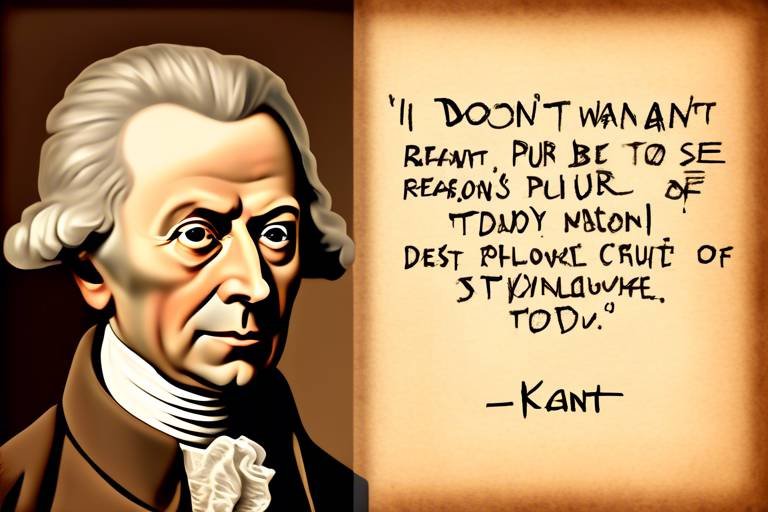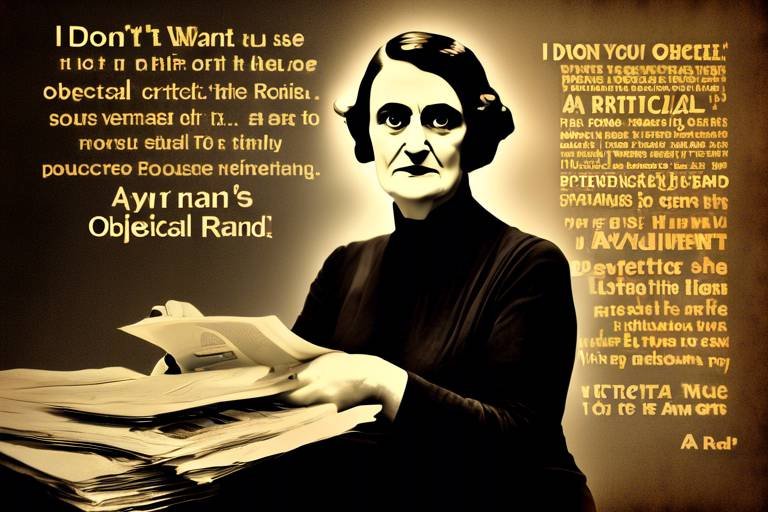The Destiny of Enlightenment in the Age of Technology
In a world that is constantly evolving, the interplay between enlightenment ideals and modern technology has become more pronounced than ever. As we navigate through the complexities of the digital age, it’s essential to understand how these advancements shape our understanding of knowledge, ethics, and personal growth. The essence of enlightenment—seeking knowledge, fostering critical thinking, and promoting ethical values—remains relevant, but how does it adapt in today's fast-paced technological landscape?
The digital revolution has transformed the way we access information. Gone are the days when knowledge was confined to dusty books and exclusive libraries. Now, with just a few clicks, we can dive into a vast ocean of information that spans across cultures and disciplines. However, this ease of access comes with its own set of challenges. Misinformation spreads like wildfire, and the lines between credible sources and dubious claims can blur. So, how do we navigate this intricate web of information while staying true to the core principles of enlightenment?
At the heart of this discussion is the importance of critical thinking. In an age where everyone can be a content creator, it’s crucial to develop the ability to discern fact from fiction. Think of it as a modern-day rite of passage; just as our ancestors learned to read the stars for guidance, we must learn to read the digital landscape. This requires not only a commitment to seeking truth but also an understanding of the ethical implications of sharing information. Are we contributing to the collective enlightenment or simply adding to the noise?
As we explore the various facets of technology's impact on enlightenment, one cannot overlook the role of social media. Platforms like Facebook, Twitter, and Instagram have redefined how we communicate and share knowledge. They can create vibrant communities where ideas flourish, but they can also become echo chambers that amplify misinformation. The challenge lies in harnessing the power of these platforms to foster genuine dialogue and understanding. Can we leverage social media to elevate our collective consciousness rather than diminish it?
Moreover, let’s not forget about the rise of e-learning platforms. These digital classrooms have democratized access to education, allowing individuals from all walks of life to pursue knowledge. Whether it's through MOOCs or specialized online courses, the opportunity for lifelong learning is more accessible than ever. This shift not only promotes personal growth but also aligns with the enlightenment ideal of empowering individuals to think critically and engage meaningfully with the world around them.
However, as we embrace these technological advancements, we must remain vigilant about the ethical implications they bring. The rapid pace of innovation often outstrips our ability to understand its moral consequences. How do we ensure that technology serves humanity rather than the other way around? This question is vital as we consider the future of enlightenment in a digital world.
Looking ahead, we can speculate on various scenarios regarding the future of enlightenment. Will we see a resurgence of interest in ethical discourse as technology continues to evolve? Or will we find ourselves further entangled in a web of misinformation and ethical dilemmas? The answer lies in our collective efforts to integrate human values with technological progress. It’s not just about what we can do with technology, but what we should do.
In conclusion, the destiny of enlightenment in the age of technology is a complex tapestry woven from the threads of knowledge, ethics, and personal growth. As we navigate this digital landscape, let’s strive to uphold the principles of enlightenment, ensuring that our advancements lead to a more informed, compassionate, and enlightened society.
- What is the significance of enlightenment in today's digital age? Enlightenment ideals emphasize knowledge, critical thinking, and ethics, which are crucial for navigating the complexities of the information age.
- How can we combat misinformation online? Developing critical thinking skills and discerning credible sources are essential for combating misinformation in the digital landscape.
- What role do e-learning platforms play in promoting enlightenment? E-learning platforms democratize access to education, fostering lifelong learning and empowering individuals to engage with knowledge critically.
- How does social media affect public discourse? Social media can enhance community engagement and knowledge sharing but can also amplify misinformation and create echo chambers.
- What ethical considerations should we keep in mind with technological advancements? It's vital to consider how technology impacts humanity and to ensure that advancements align with ethical principles.

The Historical Context of Enlightenment
The Enlightenment, often referred to as the Age of Reason, was a pivotal period in history that spanned the late 17th to the 18th century. It was during this time that thinkers began to challenge traditional authority and embrace the power of human reason. The movement laid the groundwork for modern science, democracy, and individual rights, fundamentally shaping our contemporary understanding of knowledge and ethics. Key philosophers such as Immanuel Kant, John Locke, and Voltaire played crucial roles in this intellectual revolution, advocating for principles that resonate even today.
Kant famously defined enlightenment as "man’s emergence from his self-imposed immaturity." This quote encapsulates the essence of the movement: a call for individuals to think independently and not merely accept the dogmas handed down by society. Locke's theories on government and natural rights emphasized the importance of individual liberty and the social contract, which are foundational to modern democratic systems. Meanwhile, Voltaire's advocacy for freedom of speech and religious tolerance challenged the status quo and encouraged open discourse, a principle that is vital in our digital age.
As we delve into the historical context of enlightenment, it's essential to recognize the influence of the Scientific Revolution, which preceded it. The discoveries of figures like Galileo Galilei and Isaac Newton shifted the paradigm from superstition to empirical observation. This transition not only advanced scientific thought but also inspired enlightenment thinkers to apply reason and logic to all areas of human experience, including politics, ethics, and education.
Moreover, the Enlightenment was not just a European phenomenon; it had global implications. The ideas of enlightenment spread across continents, influencing revolutions and movements for independence, such as the American Revolution and the French Revolution. These events underscored the power of enlightened thinking in challenging oppression and advocating for the rights of individuals. The ideals of freedom, equality, and fraternity became rallying cries that resonated far beyond their origins.
In summary, the historical context of enlightenment is rich and complex, marked by a profound shift in human thought. The contributions of key philosophers and the impact of the Scientific Revolution set the stage for a new understanding of knowledge and ethics. As we navigate the complexities of today's technological landscape, the principles established during the Enlightenment continue to guide our quest for knowledge and personal growth.

The Role of Technology in Knowledge Dissemination
In our fast-paced world, technology plays a pivotal role in how we access and share information. It's like having a library at our fingertips, where knowledge is just a click away. The internet has transformed the landscape of learning and communication, making it easier than ever to disseminate ideas and concepts across the globe. However, this digital revolution comes with its own set of challenges. While we are bombarded with an abundance of information, distinguishing between credible sources and misinformation has become a crucial skill. This era demands that we not only consume knowledge but also critically evaluate it.
The benefits of technology in promoting enlightenment ideals are immense. For one, it has democratized knowledge. No longer are we confined to the walls of traditional educational institutions; now, anyone with an internet connection can access a wealth of resources. This shift has empowered individuals from diverse backgrounds to pursue education and enlightenment. For example, platforms like Coursera and Khan Academy offer courses from renowned universities, breaking down barriers that once limited access to quality education. The ability to learn from anywhere at any time is a game changer, promoting a culture of lifelong learning.
However, with great power comes great responsibility. The vastness of the internet can also lead to information overload, making it challenging for individuals to discern what is relevant and accurate. This is where critical thinking becomes essential. As we engage with digital platforms, we must ask ourselves: Are we consuming information mindlessly, or are we actively questioning and analyzing the content we encounter? It's crucial to cultivate a mindset of skepticism and curiosity, ensuring that we do not fall prey to the pitfalls of misinformation.
The internet serves as an expansive resource for knowledge, acting as a hub where information flows freely. Think of it as a bustling marketplace of ideas, where you can find everything from scholarly articles to DIY tutorials. Yet, just like any marketplace, not all vendors are trustworthy. Misinformation can spread like wildfire, leading to confusion and misunderstanding among the masses. This duality of the internet—being both a treasure trove and a potential minefield—highlights the importance of discernment in our digital interactions.
E-learning platforms have revolutionized education, making it more accessible than ever before. Imagine being able to learn from the comfort of your home, at your own pace, and without the constraints of a traditional classroom setting. These platforms foster enlightenment by democratizing knowledge and providing opportunities for lifelong learning across diverse populations. They cater to various learning styles and preferences, allowing individuals to engage with content in ways that resonate with them. However, the effectiveness of these platforms hinges on the user's ability to self-motivate and critically engage with the material.
Social media has become a double-edged sword in the realm of knowledge dissemination. On one hand, it has created a space for community engagement and the sharing of ideas. Platforms like Twitter and Facebook allow users to connect with thought leaders, share insights, and participate in discussions that can lead to greater understanding and enlightenment. On the other hand, the rapid spread of misinformation can undermine these benefits. It's essential for users to navigate social media with a discerning eye, verifying facts and questioning the credibility of sources before accepting information as truth.
In conclusion, technology has undeniably transformed the way we access and share knowledge. While it offers incredible opportunities for enlightenment, it also presents challenges that require us to be vigilant and critical in our consumption of information. As we move forward in this digital age, let us embrace the tools at our disposal while remaining committed to the ideals of enlightenment—seeking truth, fostering understanding, and promoting ethical engagement.
- How has technology changed the way we learn? Technology has made learning more accessible and flexible, allowing individuals to pursue education online and at their own pace.
- What are the risks of misinformation online? Misinformation can lead to confusion and misinformed decisions, highlighting the need for critical thinking and discernment.
- Why is critical thinking important in the digital age? Critical thinking helps individuals evaluate the credibility of sources and make informed decisions based on accurate information.

The Internet as a Knowledge Hub
The internet has transformed into a colossal knowledge hub, a vast ocean of information where anyone can dive in and explore. Just think about it: a single click can unlock a treasure trove of data, insights, and perspectives from around the globe. This unprecedented access to information has the potential to empower individuals, fostering a new age of enlightenment. But, with great power comes great responsibility—how do we navigate this digital landscape without getting lost in the noise?
One of the most exciting aspects of the internet is its ability to democratize knowledge. Gone are the days when information was confined to dusty libraries or elite institutions. Now, anyone with an internet connection can access a wealth of resources, from academic articles to instructional videos. This shift has made learning more accessible than ever, allowing people from all walks of life to pursue their passions and expand their horizons.
However, this abundance of information also brings forth a significant challenge: misinformation. The internet is a double-edged sword; while it can be a source of enlightenment, it can also perpetuate falsehoods. In a world where anyone can publish content, distinguishing between credible sources and dubious claims is crucial. This is where critical thinking comes into play. It’s not just about what we learn, but how we evaluate and interpret that knowledge. We must cultivate the ability to question sources, analyze arguments, and discern fact from fiction.
To navigate this complex landscape, here are some strategies that can help:
- Verify Sources: Always check the credibility of the source before accepting information as truth. Look for reputable authors, peer-reviewed journals, and established organizations.
- Cross-Reference Information: Don’t rely on a single source. Cross-check facts with multiple outlets to ensure accuracy.
- Engage in Discussions: Participate in forums or discussion groups where diverse opinions are shared. This can provide a broader perspective and enhance understanding.
Moreover, the internet fosters a sense of community among learners. Online forums, social media groups, and educational platforms allow individuals to connect, share knowledge, and collaborate on projects. This exchange of ideas not only enriches personal understanding but also cultivates a collective pursuit of enlightenment. Just as the Enlightenment era was characterized by salons where thinkers gathered to discuss ideas, today’s digital platforms serve a similar purpose, albeit on a global scale.
Yet, as we revel in the benefits of this knowledge hub, we must remain vigilant. The rapid spread of information can lead to echo chambers, where individuals only engage with like-minded perspectives. This can stifle critical thinking and hinder the very enlightenment we seek. Thus, it’s essential to actively seek out diverse viewpoints and challenge our own beliefs to foster a more rounded understanding of the world.
In conclusion, the internet stands as a monumental force in the quest for knowledge and enlightenment. It has the power to break down barriers, democratize education, and connect individuals across vast distances. However, with this power comes the responsibility to engage critically with the information we encounter. By honing our discernment skills and embracing diverse perspectives, we can truly harness the internet as a profound knowledge hub that propels us toward a brighter, more enlightened future.
- How can I ensure the information I find online is accurate? Always verify sources, cross-reference information, and engage in discussions to gain a broader perspective.
- What role does critical thinking play in using the internet as a knowledge hub? Critical thinking helps you evaluate the credibility of sources and discern fact from misinformation.
- Can social media contribute to enlightenment? Yes, social media can foster community engagement and knowledge sharing, but it’s important to be aware of potential misinformation.

The Rise of E-Learning Platforms
The digital revolution has sparked a remarkable transformation in education, with e-learning platforms emerging as a beacon of hope for knowledge seekers everywhere. Gone are the days when education was confined to the four walls of a classroom. Today, anyone with an internet connection can access a wealth of information and learning opportunities from the comfort of their own home. This shift not only democratizes knowledge but also aligns perfectly with the ideals of enlightenment, which emphasize the importance of education and personal growth.
Imagine a world where geographical barriers no longer limit educational opportunities. E-learning platforms like Coursera, edX, and Udacity have opened the doors to prestigious institutions and experts, allowing learners from diverse backgrounds to enroll in courses that were once exclusive. This accessibility is a game-changer, particularly for individuals in remote areas or those who cannot afford traditional education. The rise of e-learning has fostered a culture of lifelong learning, encouraging people to continuously seek knowledge and improve their skills.
However, while e-learning platforms offer incredible benefits, they also present unique challenges. The sheer volume of information available online can be overwhelming, leading to a phenomenon known as information overload. This is where critical thinking becomes essential. Learners must navigate through a myriad of resources, discerning credible information from misinformation. To aid this process, many e-learning platforms have integrated features such as discussion forums, peer reviews, and interactive quizzes that promote engagement and deeper understanding.
Furthermore, the flexibility of e-learning allows individuals to tailor their educational journeys. Whether you're a busy professional looking to upskill or a stay-at-home parent seeking to learn something new, e-learning platforms provide the freedom to study at your own pace. This adaptability is crucial in today's fast-paced world, where time is often a luxury. In fact, a recent study revealed that over 70% of learners prefer online courses for their flexibility and convenience, highlighting the growing trend towards digital education.
Incorporating multimedia elements such as videos, podcasts, and interactive simulations, e-learning platforms create immersive learning experiences that cater to various learning styles. This engagement not only enhances knowledge retention but also makes learning enjoyable. As we embrace these new educational tools, we must also remain vigilant about the quality of content being consumed. The challenge lies in ensuring that the information shared is not only accurate but also ethically sound, aligning with the principles of enlightenment.
In summary, the rise of e-learning platforms marks a significant milestone in the quest for enlightenment in the digital age. By breaking down barriers and providing access to diverse educational resources, these platforms empower individuals to take charge of their learning journeys. As we navigate this exciting landscape, the fusion of technology and education continues to shape our understanding of knowledge, ethics, and personal growth.
- What are e-learning platforms? E-learning platforms are online systems that provide educational courses and resources, allowing users to learn at their own pace from anywhere in the world.
- How do e-learning platforms promote enlightenment? They democratize access to knowledge, allowing individuals from various backgrounds to learn and grow, thus fostering personal and intellectual development.
- What are some popular e-learning platforms? Some well-known platforms include Coursera, edX, Udacity, Khan Academy, and LinkedIn Learning.
- Can I learn anything online? Yes, e-learning platforms offer a wide range of subjects, from academic courses to professional development and personal enrichment topics.

The Impact of Social Media on Enlightenment
In today's fast-paced digital landscape, social media has emerged as a double-edged sword, wielding the power to either illuminate paths to enlightenment or cast shadows of confusion and misinformation. On one hand, platforms like Twitter, Facebook, and Instagram serve as vibrant arenas for sharing ideas, fostering community engagement, and sparking discussions around crucial topics. They allow individuals to connect with others who share their passions, facilitating a collective pursuit of knowledge. But, as with any powerful tool, the way we use it can significantly impact our understanding of enlightenment.
Imagine social media as a massive library filled with both enlightening texts and misleading pamphlets. The challenge lies in navigating this vast expanse of information. While you might stumble upon a profound TED Talk shared by a friend, you could also encounter a viral meme that distorts facts. In this context, critical thinking becomes our compass, guiding us through the noise. It's essential to cultivate a mindset that questions the validity of sources and seeks out well-researched information.
Moreover, the algorithms driving social media platforms often prioritize content that generates engagement over content that is factually accurate. This means that sensationalism and emotional appeal can overshadow well-reasoned arguments, leading to a skewed perception of reality. For instance, a study might show that posts with strong emotional triggers are more likely to go viral, which can lead to a spread of misinformation. This phenomenon raises serious questions about how we can foster a culture of enlightenment in a space that sometimes prioritizes clicks over clarity.
Despite these challenges, social media also holds incredible potential for promoting enlightenment. It can be a catalyst for movements that advocate for social justice, environmental sustainability, and mental health awareness. By amplifying marginalized voices and sharing diverse perspectives, social media can break down barriers to knowledge and foster a more inclusive dialogue. It's like a global town square where ideas can flourish, provided we are vigilant about the sources we engage with.
To harness the positive aspects of social media in our quest for enlightenment, we must:
- Engage critically: Always question the credibility of the information and sources you encounter.
- Promote constructive dialogue: Encourage conversations that challenge assumptions and broaden perspectives.
- Support reputable voices: Share and amplify content from credible experts and thought leaders in various fields.
In conclusion, the impact of social media on enlightenment is complex and multifaceted. While it can serve as a powerful tool for knowledge sharing and community building, it also poses significant risks of misinformation and superficial engagement. By adopting a critical mindset and actively participating in meaningful discussions, we can navigate the digital landscape more effectively and contribute to a culture of enlightenment that benefits us all.
Q1: How can I ensure the information I find on social media is accurate?
A1: Always check the credibility of the source, cross-reference with reputable outlets, and look for evidence supporting the claims made.
Q2: What role does critical thinking play in using social media?
A2: Critical thinking helps you discern fact from fiction, allowing you to engage with content thoughtfully and avoid spreading misinformation.
Q3: Can social media contribute positively to the pursuit of knowledge?
A3: Absolutely! When used wisely, social media can connect individuals, foster discussions, and amplify diverse perspectives, enhancing our collective understanding.

The Ethical Implications of Technology
As we traverse deeper into the digital age, the ethical implications of technology have become a focal point of discussion. With every new gadget, app, or platform, we face a plethora of moral dilemmas that challenge our understanding of right and wrong. Have you ever stopped to think about how your online actions might affect someone halfway across the globe? It’s a thought-provoking question that encapsulates the essence of our interconnected world.
At the heart of this ethical discourse lies the concept of responsibility. Technology, while a powerful tool for knowledge and connection, can also be a double-edged sword. For instance, consider the impact of social media on personal privacy. Platforms collect vast amounts of data, often without explicit consent, raising questions about informed consent and user autonomy. Are we truly aware of what we’re giving up in exchange for convenience? This is where the ethical implications become crucial.
Moreover, the rapid advancement of artificial intelligence (AI) presents unique challenges. AI algorithms can perpetuate biases present in their training data, leading to unfair outcomes in areas such as hiring practices and law enforcement. This raises a significant ethical dilemma: how do we ensure that AI serves humanity without reinforcing existing inequalities? The answer lies in transparency and accountability. Developers and organizations must prioritize ethical AI practices to mitigate these risks.
To further illustrate the ethical landscape, let’s consider a few key areas where technology intersects with morality:
- Privacy: The balance between data collection for improved services and the right to personal privacy is delicate. How much of our personal information are we willing to sacrifice for the sake of innovation?
- Autonomy: As technology increasingly makes decisions on our behalf, we must ask ourselves: are we relinquishing too much control? The rise of AI-driven decision-making systems could lead to a future where human agency is diminished.
- Accessibility: While technology has the potential to democratize knowledge, it can also exacerbate existing inequalities. Ensuring that everyone has equal access to technological advancements is an ethical imperative.
As we ponder these questions, it’s essential to recognize that the ethical implications of technology are not merely theoretical. They manifest in real-world scenarios that affect individuals and communities. For example, consider the impact of misinformation spread through social media. The rapid dissemination of false information can lead to public panic, undermine trust in institutions, and even influence election outcomes. This highlights the necessity for critical thinking and media literacy in our digital interactions.
In conclusion, the ethical implications of technology are vast and complex, requiring us to engage in ongoing dialogue and reflection. As we continue to innovate, we must remain vigilant about the moral dimensions of our technological advancements. After all, technology should ultimately serve to enhance our understanding and promote enlightenment, not hinder it. So, the next time you log into your favorite app or browse the internet, take a moment to consider the ethical landscape that surrounds you. Are we using technology to uplift humanity, or are we allowing it to dictate our values?
Q: What are the main ethical concerns related to technology?
A: The primary ethical concerns include privacy, autonomy, accessibility, and the potential for bias in AI systems.
Q: How can we ensure ethical use of technology?
A: Promoting transparency, accountability, and critical thinking in technology development and usage is essential for ethical practices.
Q: Why is media literacy important in the digital age?
A: Media literacy helps individuals discern credible information from misinformation, fostering informed decision-making in a complex digital landscape.

The Future of Enlightenment in a Digital World
As we peer into the horizon of our technological landscape, the question arises: what does the future hold for enlightenment in a world dominated by digital interactions? The rapid pace of technological advancements is reshaping not only how we communicate but also how we perceive knowledge and understanding. In this new digital age, enlightenment ideals are more crucial than ever, as they provide a framework for navigating the complexities of modern life.
Imagine a world where knowledge is not just a privilege for the few but a right accessible to all. This is the promise of technology. With every click and swipe, we have the potential to unlock a treasure trove of information. However, it’s essential to recognize that with great power comes great responsibility. The digital realm is a double-edged sword; while it opens doors to enlightenment, it also presents challenges that can lead us astray.
One of the most pressing concerns is the increasing prevalence of misinformation. In a landscape where anyone can publish content, discerning fact from fiction becomes a daunting task. This is where the ideals of enlightenment play a pivotal role. They urge us to cultivate critical thinking skills and encourage a culture of questioning and skepticism. In the future, fostering these skills will be paramount, as they empower individuals to navigate the vast sea of information effectively.
Moreover, as we look ahead, we must consider how technology can be harnessed to promote ethical values and human connection. The digital world should not merely be a platform for information exchange but a community where ideas flourish and diverse perspectives are celebrated. This vision requires a concerted effort to integrate technology with human values. We must ask ourselves: How can we ensure that our technological advancements align with the principles of empathy, respect, and inclusivity?
To illustrate the potential future of enlightenment in a digital world, we can envision a society where:
- Education is universally accessible through online platforms, allowing individuals from all walks of life to pursue knowledge.
- Social media serves as a tool for constructive dialogue, fostering understanding and collaboration among diverse communities.
- Artificial intelligence aids in curating reliable information, helping users sift through the noise of misinformation.
In this future, technology becomes a partner in our quest for enlightenment rather than a barrier. The integration of artificial intelligence, for instance, holds the promise of enhancing our understanding of complex subjects while also challenging us to reflect on the ethical implications of these advancements. As we embrace AI, we must remain vigilant, ensuring that it serves humanity rather than the other way around.
Ultimately, the future of enlightenment in a digital world hinges on our ability to adapt and evolve. It’s about striking a balance between embracing technological innovations and preserving the core values that define our humanity. By fostering a culture of enlightenment, we can cultivate a society that not only thrives on knowledge but also cherishes the ethical dimensions of our shared existence.
Q1: How can we combat misinformation in the digital age?
A1: Combatting misinformation requires a multi-faceted approach, including promoting media literacy, encouraging critical thinking, and utilizing technology to verify facts.
Q2: What role do social media platforms play in enlightenment?
A2: Social media can be a powerful tool for enlightenment by facilitating discussions and sharing knowledge, but it also risks spreading misinformation, making it essential for users to engage thoughtfully.
Q3: How can we ensure technology aligns with human values?
A3: To ensure technology aligns with human values, we must prioritize ethical considerations in technological development and encourage diverse perspectives in decision-making processes.

Integrating Technology with Human Values
In a world that is rapidly advancing technologically, the question of how to integrate technology with human values becomes increasingly crucial. It's like trying to balance a delicate sculpture on a moving train; the stakes are high, and one misstep could lead to disaster. As we embrace innovations that promise to enhance our lives, we must also pause to reflect on the ethical implications of these advancements. Are we using technology to uplift humanity, or are we inadvertently driving a wedge between our values and our capabilities?
At the heart of this integration lies the understanding that technology should serve humanity, not the other way around. We should prioritize human dignity, empathy, and social justice in our technological endeavors. This means that as we develop new tools and platforms, we must ask ourselves: Are we enhancing lives or complicating them? For instance, consider how algorithms influence our daily decisions, from the news we read to the products we buy. If these algorithms are not designed with ethical considerations in mind, they can perpetuate biases and inequalities.
Moreover, the integration of technology with human values requires a collaborative approach. It's essential to involve diverse voices in the conversation about technological development. By ensuring that various stakeholders, including ethicists, community leaders, and everyday users, have a say in how technology is shaped, we can create a more inclusive and enlightened digital landscape. This is where the concept of co-design comes into play, allowing for a richer dialogue about what technology should look like and how it should function in our lives.
One of the most pressing areas where this integration is needed is in the realm of artificial intelligence. As AI continues to evolve, it presents unique challenges that require a careful examination of our values. For instance, when developing AI systems, we must ensure they are transparent and accountable. This means creating frameworks that not only guide the development of AI but also hold creators responsible for their creations. The goal is to ensure that AI enhances human capabilities rather than undermines them.
To illustrate the importance of integrating technology with human values, let's consider a few key principles that can guide us:
- Transparency: Technology should operate in a way that is clear and understandable to users.
- Accountability: Developers and companies must be held responsible for the impacts of their technologies.
- Inclusivity: Technology should be accessible to all, ensuring that no one is left behind.
- Empathy: Understanding the human experience should guide technological development.
As we look to the future, the challenge lies in ensuring that our technological advancements reflect our shared human values. It’s about creating a world where technology amplifies our capacity for compassion, creativity, and community. When we successfully integrate technology with human values, we not only enhance our individual lives but also contribute to a more enlightened society.
Q: How can we ensure that technology serves humanity?
A: By prioritizing ethical considerations in technology development and involving diverse voices in the conversation.
Q: What role does AI play in integrating technology with human values?
A: AI can enhance our capabilities, but it must be developed transparently and responsibly to ensure it aligns with human values.
Q: Why is inclusivity important in technological development?
A: Inclusivity ensures that technology is accessible to everyone, preventing the marginalization of certain groups.

Enlightenment in the Age of Artificial Intelligence
As we navigate through the 21st century, the rise of Artificial Intelligence (AI) presents us with an intriguing paradox. On one hand, AI offers unprecedented opportunities for enhancing our understanding and access to knowledge; on the other hand, it raises critical questions about our autonomy, ethics, and the essence of what it means to be enlightened. Imagine AI as a double-edged sword—capable of cutting through the fog of ignorance while also posing the risk of deeper societal divides.
At its core, enlightenment is about the pursuit of knowledge and wisdom. In this digital age, AI technologies are transforming how we acquire information. They can analyze vast amounts of data, identify patterns, and even predict future trends. For instance, AI-driven algorithms curate personalized learning experiences that can cater to individual needs, making education more tailored and effective. However, this customization can also lead to echo chambers, where individuals are only exposed to information that reinforces their existing beliefs, thereby stunting true enlightenment.
Furthermore, as we integrate AI into our daily lives, we must confront the ethical dilemmas it introduces. Questions arise such as: How do we ensure that AI systems are designed to promote ethical values? Who is responsible when AI makes a mistake? These concerns highlight the need for a robust ethical framework that guides the development and implementation of AI technologies. Without such a framework, we risk creating systems that could perpetuate biases or reinforce societal inequalities.
Another fascinating aspect of AI in the context of enlightenment is its potential to democratize knowledge. Consider the following:
- AI can facilitate access to high-quality educational resources for underserved communities.
- Language translation tools powered by AI can bridge communication gaps, allowing people from different backgrounds to share ideas and collaborate.
- AI-driven platforms can analyze global trends and provide insights that empower individuals to engage in informed decision-making.
However, the flip side is that AI can also disseminate misinformation at an alarming rate. The rapid spread of false information can lead to confusion and mistrust, ultimately hindering the very enlightenment we seek to promote. Thus, it becomes imperative for individuals to cultivate a discerning mindset, equipped with critical thinking skills to navigate the complexities of information in the age of AI.
As we look to the future, the relationship between enlightenment and AI is bound to evolve. It is essential for us to reflect on how we can harness AI's capabilities while ensuring that we remain grounded in our human values. The challenge lies in finding a balance—leveraging technology to enhance our understanding without losing sight of what it means to be truly enlightened. This requires a collective effort from educators, technologists, policymakers, and individuals alike.
In conclusion, the age of AI offers a unique opportunity to redefine enlightenment. By embracing the potential of AI while remaining vigilant about its ethical implications, we can foster a more enlightened society that values knowledge, wisdom, and the interconnectedness of all human experiences.
Q1: How can AI enhance our understanding of knowledge?
A1: AI can analyze vast amounts of data, identify trends, and provide personalized learning experiences, making knowledge more accessible and tailored to individual needs.
Q2: What ethical dilemmas does AI present?
A2: AI raises questions about responsibility, bias, and the potential for misinformation, necessitating a robust ethical framework for its development and use.
Q3: How can we prevent AI from creating echo chambers?
A3: Encouraging critical thinking and promoting diverse sources of information can help individuals avoid echo chambers and foster a more well-rounded understanding of complex issues.
Frequently Asked Questions
- What is the Enlightenment, and why is it relevant today?
The Enlightenment was an intellectual movement in the 17th and 18th centuries that emphasized reason, individualism, and skepticism of traditional authority. Today, its ideals are crucial as we navigate a world dominated by technology, helping us to critically assess information and promote personal growth amidst the digital noise.
- How has technology changed the way we access knowledge?
Technology, particularly the internet, has transformed knowledge dissemination by making information more accessible than ever. With just a few clicks, we can access a wealth of resources, but this convenience also comes with challenges like misinformation, making critical thinking skills essential.
- What role do e-learning platforms play in promoting enlightenment?
E-learning platforms democratize education, allowing people from various backgrounds to pursue knowledge at their own pace. They empower individuals to engage in lifelong learning, which is a core component of enlightenment, by providing diverse courses and resources.
- Can social media contribute positively to enlightenment?
Yes, social media can foster community engagement and facilitate knowledge sharing. However, it also has a dark side, as it can spread misinformation quickly. Thus, while social media has the potential to enhance enlightenment, users must approach it with discernment.
- What ethical dilemmas arise from technological advancements?
As technology evolves, it raises important ethical questions, such as privacy concerns, data ownership, and the implications of artificial intelligence. These dilemmas challenge us to consider how we can use technology responsibly while maintaining our commitment to enlightenment ideals.
- How can we ensure that technology aligns with human values?
To align technology with human values, we must engage in discussions about ethical standards and incorporate diverse perspectives in technological development. This approach helps create a more enlightened society that prioritizes human well-being alongside technological progress.
- What impact does artificial intelligence have on our understanding of knowledge?
Artificial intelligence can enhance our ability to process and analyze information, potentially leading to greater enlightenment. However, it also poses challenges regarding autonomy and ethical considerations, prompting us to rethink what it means to understand and know in the digital age.
- What is the future of enlightenment in a technology-driven world?
The future of enlightenment will likely depend on how we navigate the relationship between technology and human values. By prioritizing ethical considerations and critical thinking, we can ensure that enlightenment ideals continue to shape a better society in our rapidly changing world.



















